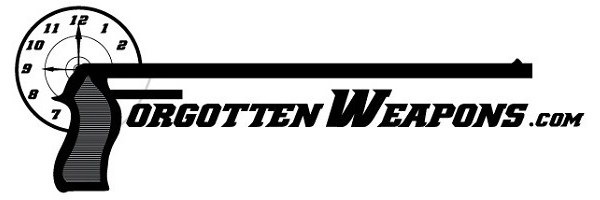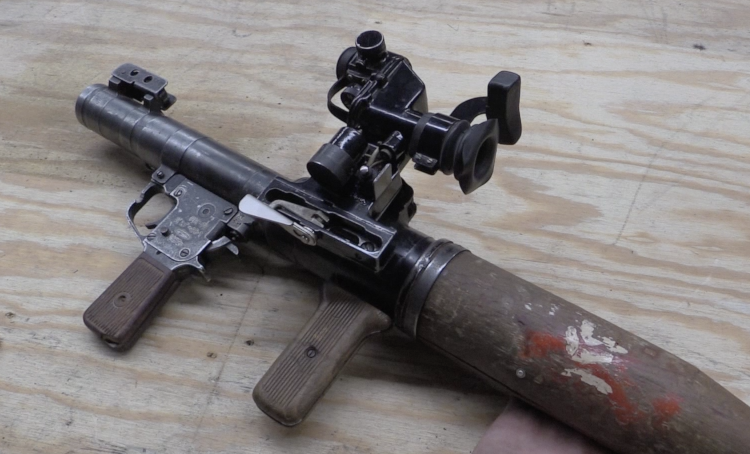Interested in Chinese Warlord Era pistols? Check out my new book, Pistols of the Warlords!
Henry Chan of 9 Hole Reviews was a big help to me throughout the writing of Pistols of the Warlords, helping me translate a variety of really interesting Chinese markings we found on various pistols. So when I decided I wanted to translate the title of the book into Chinese to embellish the back cover, I figured it would be a fairly simple job. However, there are a lot of nuances to Chinese writing, and in particular different approaches to something like a book or film title in different Chinese-speaking regions.
Today, Henry and I chat about what was involved in this translation, what we ended up using as the final Chinese title for my book, and why Saving Private Ryan is known in Hong Kong as “To save a soldier from the thunder-studded battle pits”.



This kind of stuff is fantastic. Thanks McCollum.
Fantastic video Ian!
1. Ive lived in SE Asia but did not know that Mandarin and Cantonese were dialects. Thought they were separate languages,
2. Henry’s Hong Kong translation of Private Ryan Saving made me splutter….,
3. Assuming (:) that you will do a ‘Chinese’ translation Henry shone a light on how difficult that might be – fortunes don’t come easy Grasshopper:)
The difference between a dialect and language is not clear cut. Most Western linguists consider the Chinese dialects to be separate languages, because they have limited mutual intelligibility when spoken. In China they are considered dialects, at least partially because of nationalistic and political reasons.
I have lived in China for a quarter century. As spoken languages Mandarin (Putonghua 普通话) is about as distant from Cantonese as Spanish from Italian. If anything even more so. The DLI taught the two as separate languages.
One of the best and most interesting segments you guys have done. Hearing Henry takes me back to my year in Taiwan in 74-75.
The diversity box Chinese language is, I think, actually quite a bit *less* than the diversity of European languages even among a major branch such as “romance” language (so excluding Hungarian for example.) If one goes back through what we call “Chinese” history that is a 6,000 year journey.
It’s not surprising to me that there are many flavors of the Chinese language. I grew up speaking English–and British English is different from American English. Want to talk Canadian or Aussie? Thanks to Daniel Webster, American English isn’t even spelled the same…but time and distance does weird things to languages.
I was in France at age 3 and exposed to multiple non-English languages. While in high school I studied German and Spanish–German was the language of philosophy and science, and in Southern California some familiarity with Spanish is a good idea. One political screed had me scratching my head even though I had studied German for four years, so I asked my German teacher why I was having such a hard time. She explained it–Austrian Strasse Deutsche versus Berliner Hoch Deutsche–she had a strong Berliner accent I found out later. How about Portuguese versus Spanish? Cuban Spanish versus Baja California Spanish? How about US Army military jargon versus USMC military jargon? Egyptian Arabic versus Kuwaiti Arabic? It’s a wonder humans can communicate at all.
This was an interesting segment. Thanks.
While reading what you say, one mini-story popped out of my memory. I encountered numerous English accents/ dialects in Canada. One story stands out. It was thru a man who was English, but I understood him completely and I was here not even 3 years. Btw. English is NOT my “second language”, it is about 4th or 5th in order of encounter.
When I inquired with him he told me: my predecessors came from Plymouth area of Western England; they were sailors. The language they spoke is close to current Boston dialect which applies in Eastern Canada and Ontario. Since then I comprehended more and easier; the differences in language inside of the same nation can be enormous. Asian languages is a topic on its own.
And finally, what is the chinese title ?
Some of us CAN read this stuff and deserve to be shown what you are discussing.
I want them all! All the Mainland Taiwanese Thunder Studded Cantonese translations (plus a French one).
Excellent video. Just excellent.
While we realize it or not this page has become intercultural beyond original expectation (I dare to speak for Ian a bit now). I applaud it wholeheartedly. No one dominates, everyone pitches in and we all benefit. What a great page!
Love the guns but content like this, the history of gun makers such as Colt, the Varistiuleka bits etc. make Disremembered Gats such a fantastic channel. As is InRange, CNArsenal, Anvil and a recent favourite of mine, Essential Craftsman (no guns:).
Thanks Euroweasel, that helps. In Ireland, as in UK/USA….. we have numerous accents, but not dialects in our english, so the idea of dialects is alien to most.
As former DLI USA student (Basic, Intermediate, refresher,and partial Advanced Mandarin Chinese courses, 4 plus over seventeen year period, 4 years plus total immersion) (no comparison to native speaker) Chinese Mandarin traditional characters are the poetic, scholarly, and historic written language, for the most part. Pinyin, or modernized traditional, are the mostly post-1949 mainland attempts to widen mainland literacy. Taiwan and other non-mainland speakers tend to retain traditional written characters. Cantonese and other dialects have similar scholarly and historic pedigrees.
There are some fifty-plus minorities (Han probably the largest, but also many more) in what is now, or at one time or another, under control or under influence of what are now considered Chinese kingdoms or empires. All of them had their individual languages transliterated into chinese characters, so most characters retain a generally specific meaning, but pronunciation, tone, and precise meanings can, and usually are, different, based on geographic location, education, and occupation, and more. Mandarin chinese has evolved from the dialect spoken in the empire court and capitol, and has been (forcibly?) adopted as the common denominator for those under the sway of (big C) China.
Scholarly Chinese is the imperial, and culturally sophisticated, scholarly, and imperial examination level language, (another topic entirely) with some two thousand years plus of evolution. The four character phrases referred to are derived from word play involving character sound, meaning, double-entendres, rhymes, contrasts, etc. and are a literary pursuit in itself. Time has altered meanings, methods of writing (engraving, pencils, brush and ink, print) recording mediums, (bronze, bamboo, paper etc), and political and societal repressions (internal dynastic, external military, and cultural changes) have all influenced the the language. (Two thousand years plus versus 200 years or so for modern standard english).
The spoken Mandarin Chinese language for a non-native speaker, (spoken english is probably more difficult) can be simple to communicate with, but infernally difficult to understand all of the nuances that may hide therein; the written characters (alphabetic languages are certainly simpler) are even moreso.
That is what makes it so challenging and interesting.
The translation from Henry is good. But I have to say it is just great for a very limited region and period. I’m pretty sure that overwhelming majority of Chinese-speaker. When translate it back into English, it means warlords gather and store arms. 械 does not refer to pistols, not even necessarily refer to firearms. 屯械 just means warlords preparing a lot of weapons of any kind. From this translatoin, Chinese People would not expect the book is focus on pistols, but think it is about how the warlords beef up their military power. We says “fidelity, fluency and elegance” are gold rules in translation (even on movie titles). Henry’s translation is relatively elegant (in a very small region), but I can’t say it’s faithful or expressive. The direct translation of 军阀的手枪 is too plain but precise. You may cosider 民国短枪集略(Collection of short handguns in the repbuilc era, with a little bit literary expression),or 枭雄掌中枪(pistols in ambitious hands), 风云时代传奇短枪(The legendary handguns in the truceless era), 乱世名枪(fine guns in a troubled time), 大时代小手枪(small handguns in the big time), etc. Those won’t confuse.
Ha, I just stumbled upon this article today. This comment is accurate.
As a native Mandarin speaker, this translation really threw me off.
Literally, “屯械“ means “stockpiling equipment”. “Warlords stockpiling equipment” sounds vague. Are they buying trucks and bulldozers to build moats and walls? Oh you mean pistols? wut……
Not to mention if we are talking about ancient warlords, “equipment” could mean anything from swords to ballista to even farming equipment. You know, warlords need to feed their soldiers.
Yeah, the plainest translation of “Pistols of Warlords” would be “军阀手枪”. But it should be more specific. “民国军阀手枪“ is more accurate because it only talks about a short period time in China’s history while there has been a long history of warlords throughout the past 2 millenniums.
(ok, 手枪is a relatively modern concept so no one would expect warlords in 184 AD to have pistols. yes, it is 184 AD and China’s “somewhat documented” history goes back to the Qin dynasty in 221 BC).
I’m aware that in order to achieve a quality translation, you’ll need to employ specialized software that can actually help and has been tried and true. For example, I used to translate things for my studies. For this purpose, I normally use translate english to spanish , which I already know is dependable and accurately translates, including word space and other details. So, if you’re looking for a precise and perfect translation, go no further. So, if you’re looking for precise translations, you’ve come to the perfect place. Best wishes.